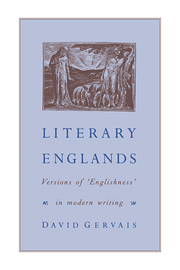Book contents
- Frontmatter
- Contents
- Preface
- Acknowledgements
- Abbreviations
- 1 The nineteenth century: pastoral versions of England
- 2 Edward Thomas: An England of ‘holes and corners’
- 3 Forster and Lawrence: exiles in the homeland
- 4 Late witness: George Sturt and village England
- 5 Contending Englands: F. R. Leavis and T. S. Eliot
- 6 Englands within England: Waugh and Orwell
- 7 Larkin, Betjeman and the aftermath of ‘England’
- 8 Geoffrey Hill and the ‘floating of nostalgia’
- Afterword: A homemade past
- Index
5 - Contending Englands: F. R. Leavis and T. S. Eliot
Published online by Cambridge University Press: 15 October 2009
- Frontmatter
- Contents
- Preface
- Acknowledgements
- Abbreviations
- 1 The nineteenth century: pastoral versions of England
- 2 Edward Thomas: An England of ‘holes and corners’
- 3 Forster and Lawrence: exiles in the homeland
- 4 Late witness: George Sturt and village England
- 5 Contending Englands: F. R. Leavis and T. S. Eliot
- 6 Englands within England: Waugh and Orwell
- 7 Larkin, Betjeman and the aftermath of ‘England’
- 8 Geoffrey Hill and the ‘floating of nostalgia’
- Afterword: A homemade past
- Index
Summary
The present is not a salutary time for assessing how the English have studied ‘English’ in this century. The missionary mood of the early days of ‘Cambridge English’ is now difficult even to imagine, let alone share, when the subject is under threat from both without and within as never before. The only thing that everyone agrees on is that there is a ‘crisis’ in English studies.
This said, one needs to remember that crises are the stock-in-trade of journalists and polemicists: if enough bystanders tell you your house is on fire you will probably ring for the fire brigade. Moreover, in this context a crisis is nothing new. Arguably, ‘English’ was born in response to a cultural crisis, as a rearguard action against ‘mass civilisation’. If it aspired to save souls, as I. A. Richards thought, that was because so many souls seemed all but lost. Not that Leavis himself had much time for such hopes; every page he wrote derives energy from his insistent need to communicate what he has to say before it is too late. In other words, he located the crisis not in the discipline itself, as we do, flawed though he thought it, but in England itself.
- Type
- Chapter
- Information
- Literary EnglandsVersions of 'Englishness' in Modern Writing, pp. 133 - 155Publisher: Cambridge University PressPrint publication year: 1993



